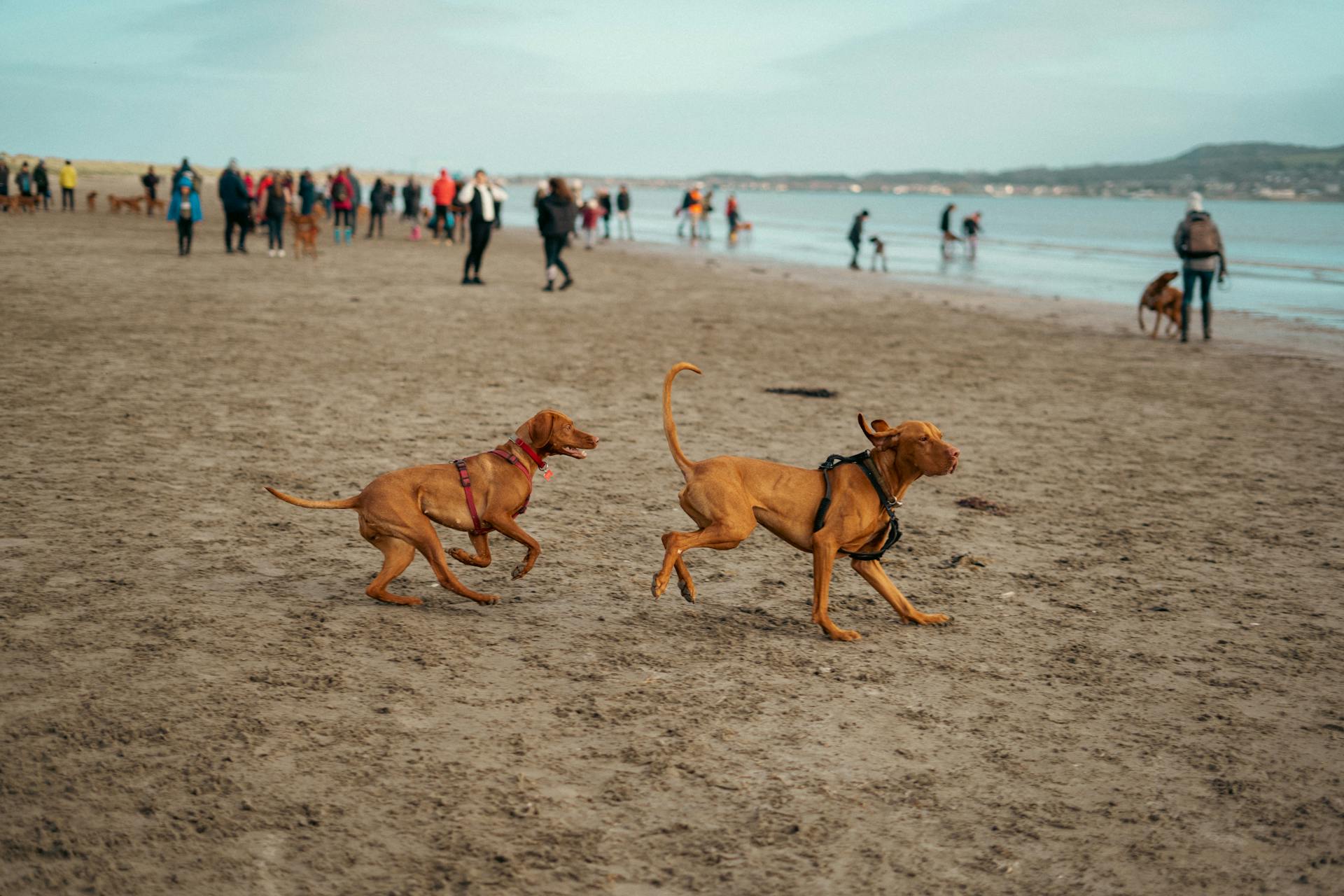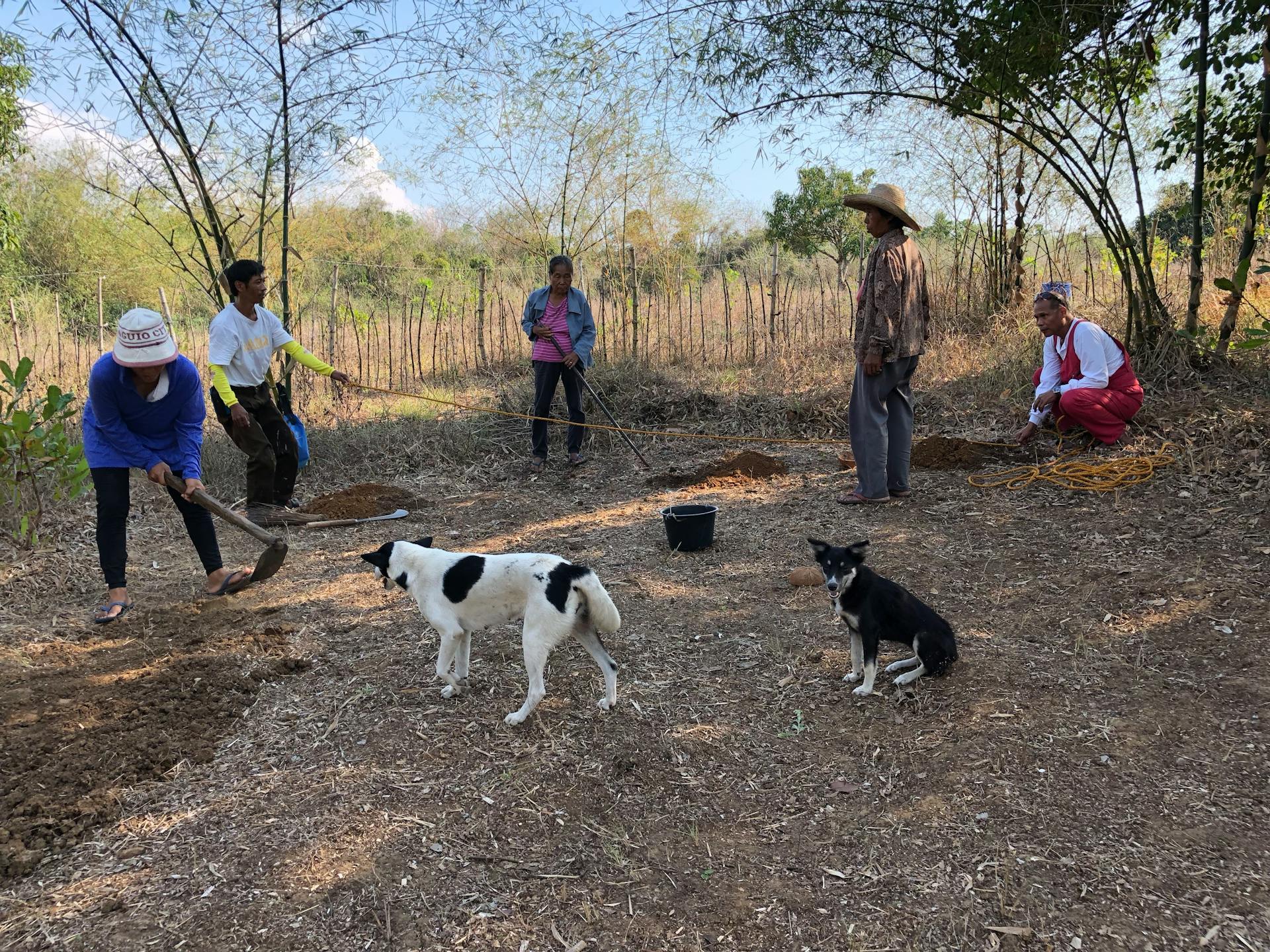
If your dog's nose is running like water, it's likely due to an underlying health issue. One possible cause is an allergy, which can lead to excessive mucus production and a runny nose.
Allergies can be triggered by environmental factors such as pollen, dust, or mold, or by food sensitivities. In fact, some dogs may have a food allergy that causes their nose to run.
The nasal discharge can range from clear to yellow or green in color, depending on the underlying cause. In some cases, the discharge may be accompanied by a strong odor.
If you notice that your dog's nose is running excessively, it's essential to take them to the vet to rule out any underlying health issues.
Additional reading: Can Allergies Cause Diarrhea in Dogs
Causes of Nasal Discharge
A runny nose in dogs can be caused by a variety of factors, including seasonal allergies, environmental irritants, and infections. Sometimes, it's just a sign that your pup is trying to cool down, especially on warm days or after exercise.
Dogs don't sweat like humans do, so they pant and lick their noses to regulate their body temperature. This can lead to a runny nose with clear liquid.
Some common causes of nasal discharge in dogs include:
- Environmental allergies, such as pollen, dust mites, or mold
- Inhaled irritants, such as dust, smoke, or strong chemical smells
- Upper respiratory tract infections, including nasal polyps or cancer
- Foreign objects, such as grass awns or small insects
- Nasal mites or other parasites
- Dental disease or trauma to the nose or mouth
If you're concerned about your dog's runny nose, it's always best to consult with a veterinarian to determine the underlying cause and develop a treatment plan.
What Causes Congestion?
Dog congestion can be caused by a variety of factors, and it's not just limited to seasonal allergies and the common cold. In fact, there are over a dozen potential causes, ranging from benign conditions to serious health issues.
Some of the most common causes of dog congestion include allergies, common colds, and bacterial infections like kennel cough. These conditions can lead to a buildup of mucus in the nasal passages, causing congestion and discomfort for your furry friend.
Tumors of the nasal passage or respiratory system can also cause congestion, and in some cases, they can be cancerous. This is a serious condition that requires immediate veterinary attention.
For your interest: Common Dog Diseases and Symptoms
Other potential causes of dog congestion include parvovirus, canine distemper, and canine influenza. These viral infections can cause a range of symptoms, including congestion, coughing, and difficulty breathing.
Fungal infections, such as ringworm, can also cause congestion in dogs. This is often accompanied by other symptoms like itching, redness, and hair loss.
In some cases, dog congestion can be caused by problems with the teeth and/or gums, or even heart disease, heartworm, and other heart-related conditions. These conditions can lead to a buildup of mucus in the nasal passages, causing congestion and discomfort for your dog.
Here are some of the potential causes of dog congestion:
- Allergies (seasonal or otherwise)
- Common colds
- Tumors of the nasal passage/respiratory system
- Kennel cough and other bacterial infections
- Parvovirus
- Canine distemper
- Canine influenza
- Other viral infections
- Fungal infections (such as ringworm)
- Problems with the teeth and/or gums
- Heart disease, heartworm, and other heart-related conditions
- Pneumonia
- Immune system diseases
- Foreign object(s) in the nasal passage
It's worth noting that some of these conditions can be treated with medication or other interventions, while others may require more serious medical attention. If you suspect that your dog is experiencing congestion, it's always best to consult with a veterinarian for proper diagnosis and treatment.
Causes
A runny nose in dogs can be caused by a variety of factors. Some common causes include allergies, inhaled irritants, and upper respiratory tract infections.
Dogs can have allergies to environmental allergens, food, or fleas, which can cause a runny nose. Seasonal allergies are common, especially during the spring and fall when pollen, mold, and yeasts are present.
Inhaled irritants, such as dust, smoke, and strong chemical smells, can also trigger a runny nose in dogs. This is because their nasal passages are sensitive to these substances.
Upper respiratory tract infections, such as kennel cough, can cause a runny nose in dogs. These infections are highly contagious and can be treated with antibiotics.
Other causes of a runny nose in dogs include nasal polyps, masses, or cancer, which can be benign or malignant. Nasal mites can also cause a runny nose in dogs.
Foreign objects, such as grass awns, can become stuck in a dog's nasal passages and cause a runny nose. This can be treated by having a veterinarian remove the object.
Here are some common causes of a runny nose in dogs:
- Allergies
- Inhaled irritants
- Upper respiratory tract infections
- Nasal polyps, masses, or cancer
- Nasal mites
- Foreign objects
Symptoms and Appearance
Your dog's nose is running like water, and you're wondering what's going on. If your dog is breathing heavily, very fast, and/or inhaling sharply, it could be a sign of congestion in their nose and airways.
This heavy breathing can sometimes produce a snoring sound, and at other times, a whistling sound. If you're not sure what's normal for your dog, pay attention to any unusual or aggressive behavior.
Some common symptoms of nasal congestion in dogs include sneezing, reverse-sneezing, or snorting, as well as a runny nose and eyes. Your dog may also be constantly scratching or touching their face, which could be a sign that they're uncomfortable.
Here are some other changes to your dog's behavior or habits that you should take seriously:
- Refusing to eat or drink, or drinking more
- Refusing to get up or move around
- Not interested in usual activities, such as fetch or walkies
If you notice any of these changes, it's a good idea to have a chat with a vet, either online or in person.
What Does Congestion Look and Sound Like?

As you're probably aware, congestion in dogs can be a bit tricky to spot, but there are some telltale signs to look out for.
You'll likely hear the congestion in your dog's nose and airways, which can manifest as heavy, fast, or sharp breathing, and sometimes even a snoring or whistling sound.
They may also display unusual behavior, such as being aggressive or withdrawn, and changes in appetite or activity levels.
Refusing to eat or drink, or drinking excessively, can be a sign that something's off.
Your dog may also show a lack of interest in their usual favorite activities, like fetch or walks.
Other physical symptoms include sneezing, reverse-sneezing, snorting, runny nose and eyes, and constantly scratching or touching their face.
Here are some common symptoms to watch out for:
- Unusual and/or aggressive behavior
- Refusing to eat or drink, or drinking more
- Refusing to get up or move around
- Not interested in usual activities
- Sneezing, reverse-sneezing, or snorting
- Runny nose and eyes
- Constantly scratching or touching the face
Accompanying Symptoms
If your dog is experiencing nasal discharge, there are several accompanying symptoms you should be aware of. Eye discharge, swelling, and redness can be a sign of conjunctivitis or other health conditions, such as an eye ulcer. Red, watery eyes are especially common during allergy season.
Intriguing read: Female Dog Brown Discharge

A decrease in appetite is another possible symptom, which can be caused by a fever, sore throat, or a very runny or congested nose that reduces their sense of smell. This can make food less appealing to your dog.
Reverse sneezing, which sounds like a snorting noise, is usually harmless but can be a sign of an underlying issue. It's often seen in smaller breeds and can be triggered by allergens, inhaled irritants, or excitement.
Bad breath can be a sign of dental disease or more serious health issues like kidney disease. Swelling of the muzzle, especially on one side, can be caused by severe dental disease or tumors/cancers of the nose.
A bloody nose can be a symptom of nasal irritation or inflammation, but it can also be a sign of toxic ingestions, blood clotting disorders, tick-borne infections, or even cancer. If you notice a bloody nose, it's essential to seek veterinary care right away.
Here are some common accompanying symptoms of nasal discharge in dogs:
- Eye discharge, swelling, and redness
- Decreased appetite
- Reverse sneezing
- Bad breath
- Swelling of the muzzle
- Bloody nose
- Symptoms of illness, such as lethargy, vomiting, gagging, weight loss, etc.
Relieving Congestion
To help your dog feel more comfortable, you can try reducing allergens in the home by vacuuming regularly with a filter vacuum, which will keep dust, mites, and other allergens to a minimum.
Keeping your dog indoors on high pollen count days can also help minimize exposure to irritants. You can also use a humidifier to help break up nasal congestion and soothe irritated nasal passages.
Some home remedies for relieving congestion in dogs include using a soft, clean, damp cloth to gently wipe away nasal discharge, and keeping plenty of clean drinking water available. If your pup's appetite is affected, try tempting them with a tasty treat like plain chicken and rice.
Here are some home remedies that can help alleviate congestion in dogs:
- Use a humidifier with plain filtered water or saline to help break up nasal congestion.
- Offer soft canned food or warm up plain chicken and rice to make it easier for your dog to smell and eat.
- Keep plenty of clean drinking water available.
- Use a soft, clean, damp cloth to gently wipe away nasal discharge.
Relieving Congestion
A trip to the vet is in order if your dog sounds congested when breathing. Early diagnosis means fast treatment, which in turn means a quicker recovery time and a higher chance of recovery success.
Regular vacuuming with a filter vacuum can help keep dust, mites, and other allergens to a minimum, reducing your dog's congested breathing.
You can't pick the right treatment or dog congestion home remedies if you don't know what's causing it. Diagnostic testing, such as blood tests, will help determine the cause.
To reduce your dog's congested breathing, keep them indoors as much as possible on high pollen count days. Avoid nasal irritants and strong odors, and use scent-free products.
Some common causes of dog congestion include seasonal allergies, common colds, and tumors of the nasal passage/respiratory system. These conditions can range from relatively benign to serious.
You can use a humidifier to help break up nasal congestion and soothe irritated nasal passages. If you don't have a humidifier, try keeping your pup in the bathroom when someone takes a hot shower so they can inhale the steam.
To help your dog feel more comfortable, keep plenty of clean drinking water available and offer soft, easy-to-swallow food like plain chicken and rice.
Here are some home remedy ideas to help reduce your dog's congested breathing:
- Use a humidifier with plain filtered water or saline
- Keep your dog indoors on high pollen count days
- Avoid nasal irritants and strong odors
- Use scent-free products
- Offer soft, easy-to-swallow food
- Keep plenty of clean drinking water available
It's essential to check with your veterinarian prior to giving any medications or supplements to your dog. Some can be toxic to dogs! Always consult with your vet before trying any new remedies.
Stopping Bleeds
Stopping Bleeds is a crucial step in relieving congestion in dogs.
To soothe your dog and keep it calm, it's essential to remain calm yourself.
Covering the nostril that's bleeding with something absorbent can help stop the bleeding.
Applying a cold compress to the top of your dog's nose, between the eyes and nostrils, can also be helpful.
Don't tilt your dog's head back to slow the blood, as this can make the bleeding worse.
If bleeding doesn't stop within a few minutes, call your vet right away.
Here are the steps to stop a nosebleed in dogs:
- Soothe your dog and keep it calm.
- Cover the nostril that's bleeding with something absorbent.
- Apply a cold compress to the top of your dog's nose, between the eyes and nostrils.
- Don't tilt your dog's head back to slow the blood.
- Call your vet right away if bleeding doesn't stop within a few minutes.
Frequently Asked Questions
Is liquid leaking from my dogs nose a symptom of respiratory infection?
Excess nasal discharge in dogs can be a symptom of respiratory infections, such as bronchitis or pneumonia, or allergies. If you're concerned about your dog's nasal discharge, it's best to consult with a veterinarian for proper diagnosis and treatment
Featured Images: pexels.com


